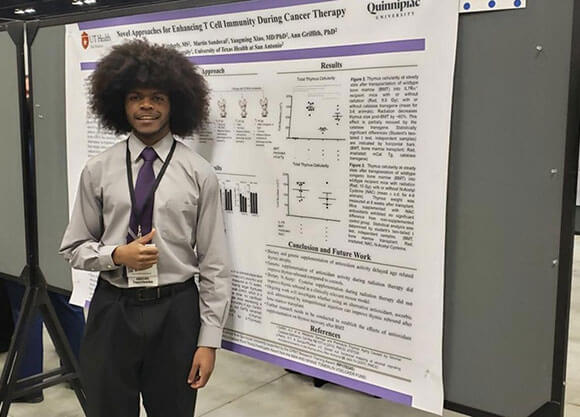
Biology major impresses with cancer research
March 18, 2019

March 18, 2019

DePass spent last summer conducting research at the University of Texas Health Science Center in San Antonio. He worked alongside immunologists studying ways to enhance T cell immunity in cancer patients following chemotherapy and radiation. The purpose of their research was to limit patients’ susceptibility to relapse and opportunistic infection.
“Our goal was to increase T cell regeneration,” DePass said, referring to the T lymphocyte cells in the body that help fight infection and cancer.
DePass and other researchers found an increase in agents negatively impacting T cell replication within the thymus, where the body’s T cells are produced. The researchers also saw a depletion in catalase, an enzyme crucial for the creation of T cells.
“It’s generally the same problems with age-related atrophy as with cancer treatment atrophy,” DePass said.
DePass and his colleagues created a series of several antioxidative treatments to be delivered in the thymus, including one that supplemented the deficiency of catalase. A study on lab mice showed that mice given treatments maintained a higher T cell count than those that did not.
“It didn’t spur regrowth, so our ultimate goal wasn’t reached, but more research needs to be done,” DePass said.
When he returned to Quinnipiac, DePass presented his findings at the Quinnipiac Science Technology and Engineering Program (QSTEP). He credits QSTEP and faculty in Quinnipiac’s Department of Biology for their persistent encouragement and feedback.
“QSTEP was very constructive,” DePass said. “I received a lot of advice toward formatting and refining my presentation.”
DePass delivered a final version of his presentation in November at the Annual Biomedical Research Conference for Minority Students (ABRCMS) in Indianapolis, Indiana. The four-day conference featured more than 2,100 students from more than 350 colleges and universities across the country to participate in poster and oral presentations in 12 STEM disciplines.
DePass’ presentation stood out from the competition, winning the award for “Outstanding Presentation in Cancer Biology.” Rather than being an end, the award signified a beginning for his research, he said.
“Seeing the many diverse opportunities available in the sciences through all of the presentations there was very eye-opening,” he said. “It motivated me to continue to raise my own bar for what I can accomplish in the sciences.”
Going forward, DePass plans to expand his understanding of research, exploring subjects such as genetics and virology. His goal is to pursue a PhD in biomedical sciences when he graduates and then begin a career in translational disease research.
DePass believes that the experience and support he continues to receive has given him a major advantage, providing him the starting point on his journey as a research scientist.
“Andrew is an example of what Quinnipiac students can become: life-long learners with growth mindsets, focused on where they want to be 10 years from now,” said Michael Vieth, senior instructor in biology.
Quinnipiac Today is your source for what's happening throughout #BobcatNation. Sign up for our weekly email newsletter to be among the first to know about news, events and members of our Bobcat family who are making a positive difference in our world.
Sign Up Now